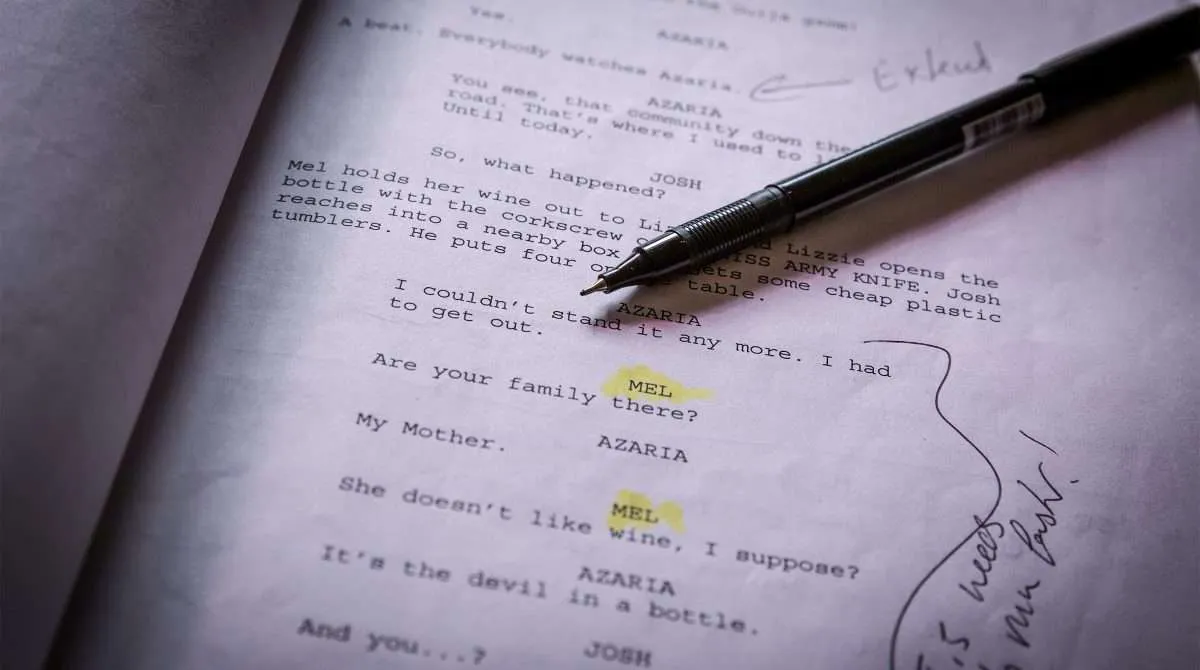
Screenwriting or scriptwriting is the art and craft of writing scripts for mass media such as feature films, television productions or video games. It is often a freelance profession.
Screenwriters are responsible for researching the story, developing the narrative, writing the script, screenplay, dialogues and delivering it, in the required format, to development executives. Screenwriters therefore have great influence over the creative direction and emotional impact of the screenplay and, arguably, of the finished film.
Screenwriters either pitch original ideas to producers, in the hope that they will be optioned or sold; or are commissioned by a producer to create a screenplay from a concept, true story, existing screen work or literary work, such as a novel, poem, play, comic book, or short story.
Writing a script helps express your creativity and make a story come to life. It often takes time and dedication to craft well-rounded characters and a compelling plot. These steps can help you create a captivating script:
Every TV series or movie (or even a book) begins with one thing – an idea. The idea can be original or inspired from a book, movie or even real-life stories.
It doesn’t matter if your idea is vague or if it’s any good. It is a start.
The very first step to scriptwriting is putting down your idea on your laptop or piece of paper immediately so you don’t forget. You don’t need to write perfect sentences. Just write down your idea in the best possible way that you can understand and move on to the next step.
Pre-write
Nail the pre-write. This will help you in the final scriptwriting process. When you have all the points jotted down, you will have a better chance of not giving up and finishing your script.
In this step, you need to put down the following things:
- Identify, as well as, design your main character or protagonist
- Take your time to build the primary conflict
- Put down the main points of the story and structure it. Put them in sequence so you know the scenes that come one after another.
You can call this stage as creating a rough draft and just assembling your ideas in one place.
Script formatting
There is a standard way of writing a script. Not many aspiring writers realize this.
One of those formatting rules include using Courier font and 12 pt. This is going to indicate the reader that you are well-versed with the formatting rules.
This is important, especially if you plan to send your script to a production company or enter a fellowship program.
Create the premise of the story
You need to come up with a unique story premise to capture the attention of your reader. Your story can be a tale of loss and love. But there should be a unique hook, which makes your story different than the rest.
Having a novel concept is one of the most important considerations of writing a script. If you write about the same things that have been shown before, your readers will lose interest.
But you can represent an old story with a modern twist. So, think very carefully about the premise of your story.
Development of the character
Most script is about following the story of the main protagonist. Sometimes, there are several main characters.
It doesn’t matter if your script has one main character or several, you need to develop the character/characters in a way that your readers get engrossed in his/her journey. Your readers must go on a literal or emotional journey with the character/s of your script.
You need to spend a lot of time in developing your character. The story must evolve and transform with the main character. Often, writers make their main character passive and that makes the readers lose interest.
When it comes to developing your main character, you can ask these questions:
- Who is your main character and why?
- What does the main character want?
- What is stopping the character from getting what he/she wants?
The questions will act as compasses. They will guide you towards making the character interesting and also give ideas for your pot development.
Development of the plot
Nobody likes a plot that is dragging and beating around the bush. This will kill the interest of the readers.
Even if your story is very common, you need to develop the plot in a way that keeps your readers on their toes. Always guessing what will happen next. Keep them unaware and that will make them interested.
Your plot must build tension and lead to a compelling climax, which should then lead to a gratifying solution. Though, you can also keep your story open-ended as most writers are leaving it that way and making readers use their imagination.
Open-ended endings mean there can be more than one possible ending. Keep your readers guessing even after the movie is over. But, for that, you have to have a solid plot structure.
Dialogue of the script
How your characters interact with each other is crucial. The story will be told to the audience through the dialogues.
While it is crucial to maintain a tone of realism, the dialogues should also be entertaining sometimes to break the monotony. Every dialogue should move the story along.
There might be instances where you have to introduce characters through dialogues. So, remember that this is not a one-day work.
It might take weeks to perfect dialogues between your characters. It is important that you do not give up.
Final words for aspiring script writers
These are only the basic of scriptwriting. For writing a successful script, you have to work on word building and build your vocabulary. You also have to watch a lot of movies and read a lot of books.
You might even have to take courses on character and plot development. There are more ways to represent an idea and your creativity should shine through your script.
https://en.m.wikipedia.org/wiki/Screenwriting
https://www.nfi.edu/script-writing/
https://orange-publishers.com/how-to-write-script/





























